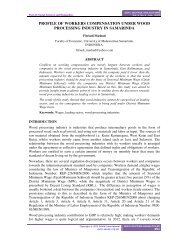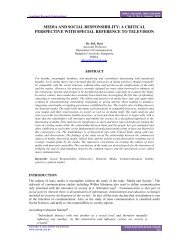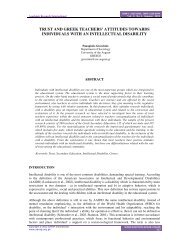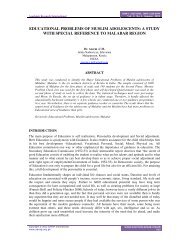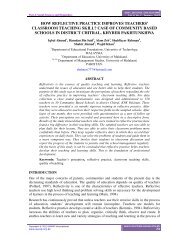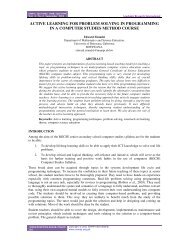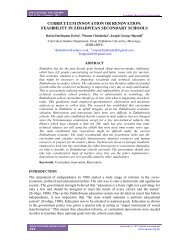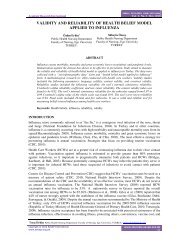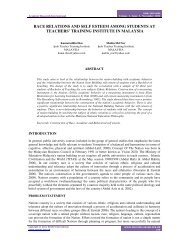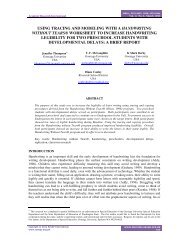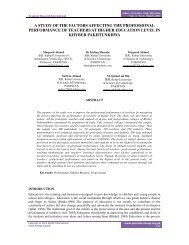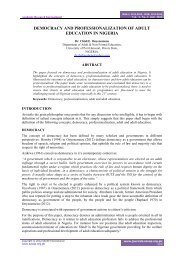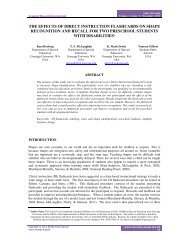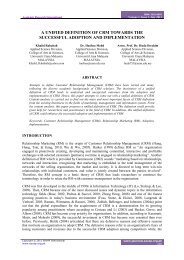Vol. 1(2) SEP 2011 - SAVAP International
Vol. 1(2) SEP 2011 - SAVAP International
Vol. 1(2) SEP 2011 - SAVAP International
You also want an ePaper? Increase the reach of your titles
YUMPU automatically turns print PDFs into web optimized ePapers that Google loves.
Academic Research <strong>International</strong><br />
ISSN: 2223-9553<br />
<strong>Vol</strong>ume 1, Issue 2, September <strong>2011</strong><br />
The foundation for primary level of education is laid at the pre-primary level. The early childhood<br />
level serves as a preparatory ground for the primary level. The curriculum of this introductory level<br />
prepares the child for basic education.<br />
(c) To provide adequate care and supervision for the children while their parents are at work (on<br />
the farm, in the markets, offices, etc);<br />
The economy of Nigeria is in a bad shape, hence, an increasing number of housewives are now<br />
joining their husbands to fend for/contribute to the family income and upkeep. When mothers go to<br />
work there is the need for someone to take care of the children. House helps and nannies are not easy<br />
to come by these days. As a result of this, mothers/families are compelled to take their children to day<br />
care and other pre-primary school facilities in order to have the opportunity to go about their jobs.<br />
(d)<br />
To inculcate social norms;<br />
Every society has its own etiquette, savoir-fair, savoir-vivre and other mores which it necessarily<br />
bequeaths to its younger generations. The process of imparting all these social skills into children<br />
starts at the early childhood education level in Nigeria.<br />
(e) To inculcate in the child the spirit of enquiry and creativity through the exploration of nature,<br />
the environment, art, music and playing with toys, etc;<br />
At this stage the child ought to explore his/her environment and ask questions as far as his/her<br />
intellect allows him/her. Answers should always be given to all his/her questions no matter how<br />
stupid they may seem. Correspondingly too, the child must be given the opportunity to play and<br />
experiment with as many toys as can be provided.<br />
(f)<br />
To develop a sense of co-operation and team spirit;<br />
Children have the opportunity of playing together at the foundation level of education. As they do<br />
this, they learn to cooperate with one another. And, of course, since many of them come from<br />
different homes they also learn how to tolerate one another.<br />
(g)<br />
To learn good habits, especially good health habits;<br />
Children are taught good habits at this level of education. They ought to be taught to say good<br />
morning sir to daddy, good morning ma’am to mummy, among others. They also ought to be taught<br />
that it is unhygienic to pick things from the ground and put them in the mouth.<br />
(h)<br />
To teach the rudiments of numbers, letters, colours, shapes, forms, etc, through play.<br />
At this elementary level the child should be taught counting of numbers and reading of alphabets with<br />
fun. In fact, it is not uncommon to see a child at this stage count 1-10 without being able to recognize<br />
any of the numbers or read A-Z even though he/she cannot recognize any of the alphabets.<br />
A quick review of the foregoing shows that the curriculum philosophy anchoring early childhood<br />
education in Nigeria is hinged on the concept of “pleasurable activity”, hence, the NPE (2004)<br />
specifies that the main method of teaching at the pre-primary education level should be through play.<br />
This is consistent with the observation of Garvey (1990) which holds that a curriculum philosophy<br />
which is based on play might imply to us; (a) supply materials and toys, and (b) give the child time to<br />
interact with them and play. This implies that preschool curriculum should be based on the Whole<br />
Child principle. Inan (2009) while expatiating on the Whole Child principle draws on the findings of<br />
Bowe (2000) which suggest that to enhance the development of the child, the teacher should attend to,<br />
assess, and intervene in all the 5 domains, namely, the adaptive, cognitive, communication, physical,<br />
and social/emotional domains. Bowe asserts that “by looking at the whole child, the preschool special<br />
educator can help a child develop strengths not just improve on areas of weakness”. In every<br />
domain attention is given to the play concept. This “attention” is probably best explained with the<br />
analogy of the human brain which is likened to the computer memory in the central processing unit<br />
(CPU). If one gives the right command, it does what one desires the right way. If one gives a wrong<br />
command, it either produces negative results or refuses to do anything at all. In like manner, if one<br />
Copyright © <strong>2011</strong> <strong>SAVAP</strong> <strong>International</strong><br />
www.savap.org.pk<br />
www.journals.savap.org.pk<br />
209



